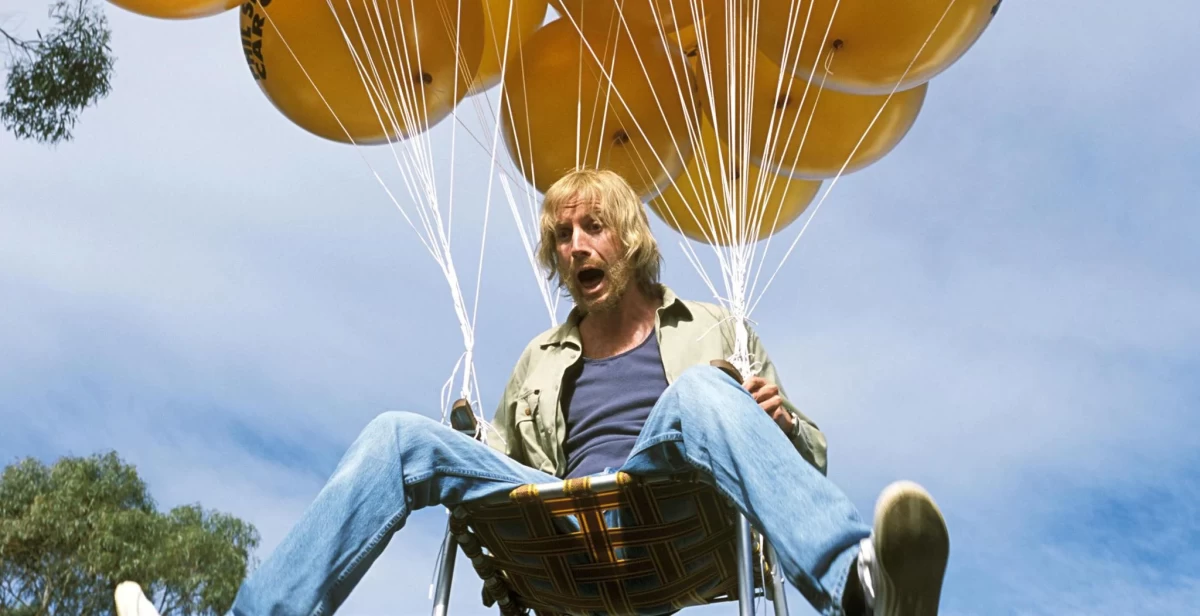 Jeff Balsmeyer, Danny Deckchair, 2003
Jeff Balsmeyer, Danny Deckchair, 2003Daydreaming about an upcoming camping trip, concreter Danny Morgan (Rhys Ifans) falls in the cement. With the help of his exasperated workmates, he shakes off the hardening concrete, looking like a strange statue come to life. At home, the figurative concrete sets, when his girlfriend Trudy (Justine Clarke) tells him she can’t go camping because her boss will be on leave that week.
She’s lying. In truth, Trudy, an ambitious realtor, has landed a dream appointment to show property to local television sportscaster Sandy Upman (Rhys Muldoon). Danny lashes out with a childish belligerence and Trudy is fast tiring of his generally unsophisticated behavior. Compared to charismatic Sandy, Danny is really starting to seem like the woolly-faced caveman he resembles.
With the holiday cancelled, Danny mopes around their suburban Sydney home. Thinking he’s out one afternoon, Trudy dials a friend to bemoan his immaturity; now that her career’s taking off, she sees him as one of the “little people.” Hearing the conversation, Danny surprises her at work the next day with flowers, but finds her boss instead. Realising her deceit, Danny storms off, whereupon he spots Trudy with big-shot Sandy in his fancy car.
During a barbeque Trudy has organized in lieu of the vacation, Danny demonstrates that little people can attain great heights by tying helium-filled balloons to a deckchair. As he flies away, his friends and neighbours all cheer his inventiveness, then panic when he disappears from sight. Entering a patch of storm clouds, he floats north to Clarence, a country town celebrating its annual fair with fireworks. When his balloons burst, he lands in Glenda’s (Miranda Otto) backyard with only minor cuts and bruises. Asked by other locals to explain her sudden guest’s appearance, she pretends he’s a university professor from her past. Embraced by the town overnight, Danny has gone from being a little person to big man on campus.
Now dubbed “the Professor,” Danny seems heaven sent for Glenda; she never asks about details of his past. Back home, Trudy becomes a celebrity by telling her story on a current affairs segment showing how Danny’s take to the sky has inspired people to do what they always wanted. One man, for instance, climbed a telegraph pole because it was a lifelong dream.
Danny also becomes a source of inspiration in Clarence, a small town where everybody knows your name. At home he was a larrikin rarely taken seriously, but here his supposed professorial otherness is an elixir to all, especially Glenda, who had, prior to his arrival, been cast in the role of lonely spinster by the gossipy town. It’s strange, really, considering that Glenda, who works as a parking inspector, is young, smart, and attractive. (Parking cops are often depicted in Australian films as losers.)
It is apt that she spends her day billing people for staying too long in the one place, because in Clarence, no one ever wants to leave. The job symbolizes the penalties bestowed on those who don’t maintain perpetual motion. Danny, who felt cloistered in Sydney, knows this only too well. Glenda, feeling trapped and bored in Clarence, doesn’t see the irony of her job.
The rest of the plot couldn’t be more predictable or implausible, but therein lies its charm. Though its premise was inspired by “true events,” first time writer-director Jeff Balsmeyer lets the action unfold like a picture book fantasy, in keeping with its light and breezy (pun intended) subject matter. Balsmeyer, who has had an extensive career as a storyboard artist, showcases his visual flair by contrasting dull suburban conformity with country “authenticity.”
Indeed, the panoramic landscape shots from the sky allow for some breathtaking moments, despite occasional lapses into seeming travelogue. Like many other Australian films, Danny Deckchair appears to fetishize the native landscape for the benefit of securing international distribution. As a result, the landscape is categorized into a binary opposition of city versus country. Depicted here is a city comprising a suburban area that, in reality, is significantly distanced from the cityscape seen from Danny’s birds-eye view. When he floats towards the iconic Sydney landmark of Centrepoint Tower, it smacks of touristy appeal. (More darkly, the image evokes post-9/11 anxieties associated with the tenuous relationship between iconic buildings and unidentified aircraft.)
The postcard look of the film glosses over the ideology that the city is less a place than a mindset that produces people too busy, ambitious, and soulless. In contrast, the country is glorified as a return to nature and uncorrupted values. By reinforcing these distinctions throughout, the film shows how Aussie culture thrives on a Tall Poppy Syndrome: the tendency to cut down to size those who achieve career success and fame, in favor of a working class “little people” ideal.
That such an uncritical ideal continues to remain unchecked might explain why Danny embodies a charming, less boorish version of the usual Australian “ocker.” This uncultivated, working class male archetype has long been romanticized in Australian cinema, and Danny Deckchair maintains its mythic aura. Welsh-born Ifans convincingly performs this culturally specific persona, though it might not be such a stretch, considering he’s played the quintessential slob before in Notting Hill (1999) and Human Nature (2001).
Otto, who also starred with Ifans in Human Nature, has little to do. Clark, best known for her work on Australian television, and Rhys Muldoon, in his feature film debut, steal the show. They play Tall Poppy upstarts (Sandy’s last name is Upman) whose insincerity contrasts with the honesty of little people like Danny and Glenda. Ironically, these big people make the lasting impression.
Film review of Danny Deckchair (Jeff Balsmeyer, 2003) for PopMatters.
Published by PopMatters in 2004.